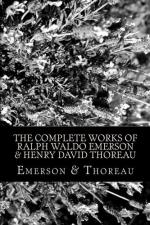|
This section contains 486 words (approx. 2 pages at 300 words per page) |

|
SOURCE: “Thoreau's ‘Smoke,'” in The Explicator, Vol. 17, No. 7, April 1959, Item 47.
In the following note, Rodabaugh contends the “flame” in the last line of the poem “Smoke” is another indication of Thoreau's paganism.
The last two lines of “Smoke,” by Henry Thoreau, embody the author's characteristic paganism. F. O. Matthiessen points out (American Renaissance, p. 166), that “clear flame” includes in its meaning the flame of Thoreau's own spirit—so confident and firm that it approaches hubris. Such a reading is supported by the poem's context, which is the entire book Walden. I wish to go further and suggest reasons why the literal flame, the one in Thoreau's fireplace, is a clear flame. In using this expression Thoreau may be asserting once again his contention that it is not man's business to worship, in any ordinary sense, the Deity; that is, the significance of “clear” may be that there...
|
This section contains 486 words (approx. 2 pages at 300 words per page) |

|


